Faculty award winners from Nine Universities Also Announced; Professors to Receive $10,000 Grants for Watson Curriculums
LAS VEGAS, NEVADA – 23 Oct 2012: Cornell University and IBM today announced the winners of the second Watson Academic Case Competition. The contest helps students build skills in analytics, big data and cognitive computing by identifying new ideas for applying IBM Watson to solve societal and business challenges.
With a 48 hour timeframe, 55 Cornell business and computer science students worked as part of mock IBM Watson commercialization teams, each charged with selecting an industry and developing an application that could best use the IBM Watson system in a real-life business environment.

From L-R Andrew Freiman and Ali Hamed, undergraduate business school students Cornell University; and Daniel Londono, undergraduate computer science school student at Cornell; huddle together during the IBM Watson case competition kick off event on campus. (Image credit: Slope Media)
Since its historic victory on Jeopardy!, Watson has ushered in a new era of cognitive computing systems that can answer questions and then learn and become more accurate over time. Cognitive computing systems have the ability to arrive at optimal decisions by processing information in ways that mimic the human brain, and to understand natural language and all of its nuances. By culling through vast amounts of big data, this new class of analytical systems will help transform business decision-making by providing specific recommendations and actionable insights to complex issues, from healthcare to financial services.
Similar to the case competition hosted at The University of Rochester this past spring, the IBM/Cornell contest challenged students to submit proposals outlining how the Watson technology could be applied to solve complex challenges in professional fields including human resources, customer service and R&D. The 17 teams comprised a diverse range of skill sets, including students with backgrounds in marketing, computer science, engineering, economics and entrepreneurship, among other fields.

Olivia Krebs, an undergraduate business school student Cornell University delivers a passionate presentation during the IBM Watson Case Competition. (Image credit: Slope Media)
Three winning ideas were selected by a panel of judges comprised of faculty and IBM experts. Team evaluations were based on the ability of the students to clearly articulate the business case including market research, tactical planning and feasibility while exhibiting an understanding of how to harness data for strategic outcomes.
· First Place: Customer Service: Say Hello to Watson – Every day, consumers with urgent questions about their electronic devices, call, e-mail, post and chat with customer service representatives. The answers to their questions are often elusive and require long wait times with less than 50% of first calls being resolved. The first place team created a case for Watson to look at unstructured and structured information to help consumer electronics firms answer inquiries with greater accuracy and faster response times ultimately creating happy customers.
· Second Place: Watson Helps You Plan Your Next Beach Getaway Faster – Today’s traveler has access to an overwhelming amount of information for planning business trips and vacations, including websites that aggregate flight and hotel rates, tourism sites packed with things to do, and millions of online reviews from fellow travelers. The second place team developed a system that would help travelers make better, faster decisions, using Watson’s ability to analyze massive amounts of information and recommend the best options.·
· Third Place: You’re Hired! Big Data Helping HR – The Harvard Business Review points out that as much as 80% of employee turnover is due to bad hiring decisions, so with no margin of error for hiring quality candidates, businesses need a smarter approach to attracting skilled, experienced workers. The third place team developed an adaptive human capital management model that calls upon Watson’s ability to quickly comb through data and make informed recommendations, to help businesses match open jobs with the best candidates.
“The competition was an excellent exercise in bringing together two very important worlds here at Cornell – the business student world and the technical student world. We connected and learned how to work together through this roll-up-your-sleeves case study format,” said Evan Maclin, a Junior in the undergraduate business school at Cornell University. “One of the greatest takeaways was the brainstorming and research aspect, where we brought together use cases for Watson, because as we quickly learned, the possibilities are endless.”
The Watson case competition supports Cornell’s commitment to incorporating analytics and evidence-based reasoning across all areas of business ranging from marketing to economics and brand development to entrepreneurship. The initiative is part of IBM’s ongoing collaboration with educational institutions to strengthen science, technology, engineering and mathematics (STEM) skills.
“The Watson case competition provides a very unique way for students to bring forward some game-changing ideas while providing them with the opportunity to hone their skills in important areas such as analytics and cognitive computing,” said Rhett L. Weiss, Executive Director, Entrepreneurship and Innovation Institute and Lecturer of Management, Cornell University. “Our goal is to inspire the next generation of business leaders to think differently about how technology can be used to transform business and redefine industries, and the work we did this past weekend with IBM was just that.”
The case based approach may help shape how IBM applies cognitive computing capabilities to client challenges across a variety of industries in the future. IBM is already putting Watson to work in the health care and financial services industries. For example, part of pilot programs with WellPoint, Memorial Sloan-Kettering Cancer Center, and Citigroup that are exploring ways to improve decision making in the health care and banking client industries.
The IBM Watson academic case competitions are the latest example of how IBM is helping universities to prepare students in new areas of computing and business leadership. The Cornell effort is in keeping with IBM’s Academic Initiative which delivers coursework, case studies and curricula to more than 6,000 universities and 30,000 faculty members worldwide to help students prepare for high-value job opportunities in the future. IBM worked closely with academic institutions during the development and introduction of Watson. Eight leading universities around the world participated in the development phase of the system; and more than 10,000 students watched Watson triumph on the Jeopardy! quiz show in February 2011. IBM has also recently completed the first-ever Watson internship program.
IBM Awards Universities for Developing Watson Based Curriculums
As part of today’s news, IBM also announced the winners of its 2012 Watson Solutions Faculty Award Program where ten university professors from across the country will each receive $10,000 grants to implement Watson based curriculums that mix business and technical skills. The ten winning proposals include introductory-to-graduate level courses designed to apply cognitive computing technologies to solve challenges in such areas as healthcare and environmental sustainability.
The Watson faculty awards come are part of an ongoing effort to expand and strengthen student skills and understanding of cognitive systems like Watson, including big data and analytics, in order to meet the growing demand for highly skilled analytics workers. According to the U.S. Bureau of Labor Statistics, there will be a 24 percent increase in demand for professionals with management analysis skills over the next 8 years. While the McKinsey Global Institute projects a need for approximately 190,000 more workers with analytics expertise and 1.5 million more data-savvy managers in the U.S..
“Recognizing that a practical understanding of analytics is key for 21st century jobs and firm competitive success, we continue to work hard to inspire universities and students around the country to engage in the many programs we have to offer such as case competitions and faculty awards,” said Manoj Saxena, general manager, IBM Watson Solutions. “IBM is leading the way for a new generation of thinkers by helping these academic institutions expand curriculums that enhance kills in analytics and cognitive computing. Graduates will enter the workforce with a unique set of skills giving them an early advantage as the next era of cognitive computing and analytics continue to impact every facet of business.”
Watson Faculty Award Winners:
· Raja Sooriamurthi, Carnegie Mellon University (CMU) – An elective course in Information Systems that challenges interdisciplinary student teams to apply big data, analytics and IBM Watson’s technology towards advancing environmental sustainability.
· Andrew Rosenberg, City University of New York City (CUNY) – A new graduate course called Advanced Natural Language Processing introducing students to state-of-the-art NLP methods, while challenging them to present critiques and conduct practical experiments applying the techniques to problems.
· Nitesh Chawla, University of Notre Dame – An inter-disciplinary course through which students learn to apply technical concepts to health care problems, while local healthcare providers, health exchanges and researchers provide real world perspective.
· Wullianallur Raghupathi, Fordham University –A new capstone course to be launched as part of the university’s M.S. in Business Analytics Program, enabling group-based learning around specific industry/domain areas such as healthcare and finance, utilizing the Watson architecture/framework.
· Heng Ji, University of New York City (CUNY) – A new course providing a knowledge foundation in Machine Learning, Natural Language Processing and Cognitive Computing, also providing skill development at the intersection of NLP and Machine Learning via cognitive computing.
· Andrey Soares, Southern Illinois University –Carbondale – A new introductory course to help prepare healthcare and IT professionals to support the process of representing healthcare knowledge for use with cognitive systems.
· Diego Klabjan, Northwestern University – As part of the emerging Master of Science in Analytics program, a new course focusing on big data analytics based on Hadoop, specifically devoted to Watson.
· Girish Punj, University of Connecticut (UCONN) – A new experiential learning course through which students from a variety of academic disciplines work as a team on a semester-length project focusing on the potential business applications and capabilities of Watson.
· Zsuzsanna Fluck, Michigan State University (MSU) – an interdisciplinary program introducing students from business, science, engineering and other fields to cutting-edge disruptive technologies, their business applications, and how new technologies can transform businesses, industries and lives.
· Noushin Ashrafi, University of Massachusetts – Boston –Courses that incorporate the building blocks of the Watson framework, offered via the Information Architecture track within UMASS Boston’s Information Technology undergraduate program.
IBM is working with more than 200 academic organizations around the world specifically in the area of analytics, big data and cognitive computing. Schools include universities such as Fordham, Yale School of Management, University of Rochester, Northwestern University, Michigan State University, University of Southern California Annenberg, DePaul University, University of West Scotland, Deakin University, Indian Institute of Management Calcutta, Xi’an Jiao Tong University, University of Ulster, IAE Aix-en-Provence, EDC business school in France, Ottawa University Telfer School of Management, among others.
*Source: IBM
